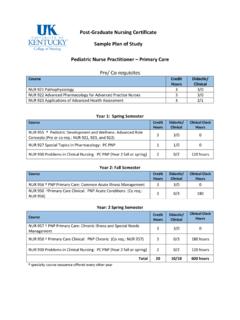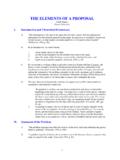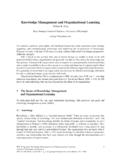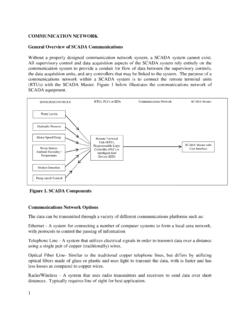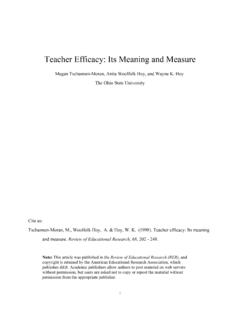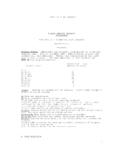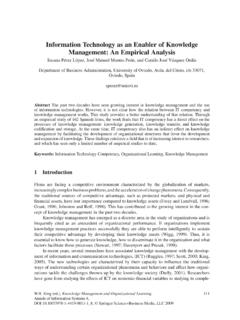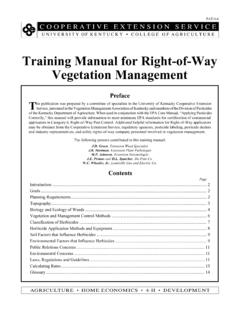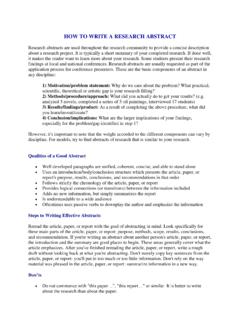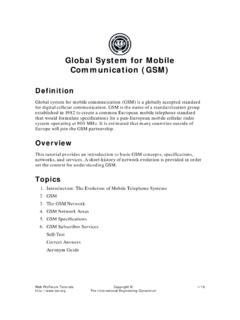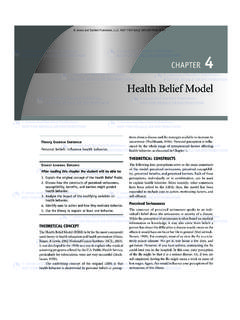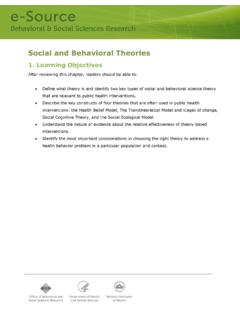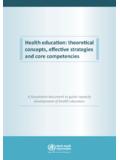Transcription of Health Promotion by Social Cognitive Means
1 Education & Behavior(April 2004)Bandura / Health Promotion312 AprilHealth Promotion by Social Cognitive MeansAlbert Bandura, PhDThis article examines Health Promotion and disease prevention from the perspective of Social Cognitive the-ory. This theory posits a multifaceted causal structure in which self-efficacy beliefs operate together with goals,outcome expectations, and perceived environmental impediments and facilitators in the regulation of humanmotivation, behavior, and well-being. Belief in one s efficacy to exercise control is a common pathway throughwhich psychosocial influences affect Health functioning. This core belief affects each of the basic processes ofpersonal change whether people even consider changing their Health habits, whether they mobilize the motiva-tion and perseverance needed to succeed should they do so, their ability torecover from setbacks and relapses,and how well they maintain the habit changes they have achieved.
2 Human Health is a Social matter, not just anindividual one. A comprehensive approach to Health Promotion also requires changing the practices of socialsystems that have widespread effects on human : Social Cognitive theory; self-efficacy; self-regulation; collective efficacy; self-management modelI am deeply honored to be a recipient of the Healthtrac Award. It is a specialhonor tobe recognized by a foundation that promotes the betterment of human healthin the ways Ivalue highly. In comparing myself to the figure Larry so generously described, I feel likea Swiss yodeler following field of Health is changing from a disease model to a Health model. It is just asmeaningful to speak of levels of vitality and healthfulness as of degrees of impairmentand debility.
3 Health Promotion should begin with goals, not Health is the goal,biomedical interventions are not the only Means to it. A broadened perspective expandsthe range of Health -promoting practices and enlists the collective efforts of researchersand practioners who have much to contribute from a variety of disciplines to the Health ofa quality of Health is heavily influenced by lifestyle habits. This enables people toexercise some measure of control over their Health . By managing their Health habits, peo-ple can live longer and healthier and retard the process of aging. Self-management isgood medicine. If the huge Health benefits of these few habits were put intoa pill, it wouldbe declared a scientific milestone in the field of Bandura, Department of Psychology, Stanford University, Stanford, reprint requests toAlbert Bandura, Department of Psychology, Stanford University, Stanford, Cali-fornia 94305-2130; e-mail: major portion of this article was presented as the Healthtrac FoundationLecture at the convention of theSociety for Public Health Education in Philadelphia, November 9, Education & Behavior, Vol.
4 31 (2): 143-164 (April 2004)DOI: 2004 by SOPHES upply-Side Versus Demand-Side ApproachesCurrent Health practices focus heavily on the medical supply side. The growing pres-sure on Health systems is to reduce, ration, and delay Health services to contain healthcosts. The days for the supply-side Health system are limited. People are living creates more time for minor dysfunctions to develop into chronic diseases. Demandis overwhelming supply. Psychosocial factors partly determine whether the extended lifeis lived efficaciously or with debility, pain, and ,3 Social Cognitive approaches focus on the demand side. They promote effective self-management of Health habits that keep people healthy through their life span.
5 Agingpopulations will force societies to redirect their efforts from supply-side practices todemand-side remedies. Otherwise, nations will be swamped with staggering Health coststhat consume valuable resources needed for national Cognitive THEORYThis article focuses on Health Promotion and disease prevention by ,5 Social Cognitive theory specifies a core set of determinants, the mechanismthrough which they work, and the optimal ways of translating this knowledge into effec-tive Health practices. The core determinants includeknowledgeof Health risks and bene-fits of different Health practices,perceived self-efficacythat one can exercise control overone s Health habits,outcome expectationsabout the expected costs and benefits for differ-ent Health habits, the healthgoalspeople set for themselves and the concrete plans andstrategies for realizing them, and theperceived facilitatorsand Social and structuralimpedimentsto the changes they of Health risks and benefits creates the precondition for change.
6 If peoplelack knowledge about how their lifestyle habits affect their Health , theyhave little reasonto put themselves through the travail of changing the detrimental habits they enjoy. Butadditional self-influences are needed for most people to overcome the impediments toadopting new lifestyle habits and maintaining them. Beliefs of personal efficacy play acentral role in personal change. This focal belief is the foundation of human motivationand action. Unless people believe they can produce desired effects by their actions, theyhave little incentive to act or to persevere in the face of difficulties. Whatever other factorsmay serve as guides and motivators, they are rooted in the core belief that one has thepower to produce desired changes by one s behavior is also affected by the outcomes people expect their actions to pro-duce.
7 The outcome expectations take several forms. The physical outcomesinclude thepleasurable and aversive effects of the behavior and the accompanying material lossesand benefits. Behavior is also partly regulated by the Social reactions itevokes. The socialapproval and disapproval the behavior produces in one s interpersonal relationships is thesecond major class of outcomes. This third set of outcomes concerns the positive and neg-ative self-evaluative reactions to one s Health behavior and Health status. People adoptpersonal standards and regulate their behavior by their self-evaluativereactions. They dothings that give them self-satisfaction and self-worth and refrain from behaving in waysthat breed self-dissatisfaction.
8 Motivation is enhanced by helping people to see how habitchanges are in their self-interest and the broader goals they value highly. Personal goals,rooted in a value system, provide further self-incentives and guides for Health goals set the course of personal change. But there are too many competing144 Health Education & Behavior(April 2004)influences at hand for distal goals to control current behavior. Short-term attainable goalshelp people to succeed by enlisting effort and guiding action in the here and change would be easy if there were no impediments to surmount. Theper-ceived facilitators and obstacles are another determinant of Health habits. Some of theimpediments are personal ones that deter performance of healthful behavior.
9 They forman integral part of self-efficacy assessment. Self-efficacy beliefs must be measuredagainst gradations of challenges to successful performance. For example, in assessingpersonal efficacy to stick to an exercise routine, people judge their efficacy to get them-selves to exercise regularly in the face of different obstacles: when theyare under pressurefrom work, are tired, feel depressed, are anxious, face foul weather, and have more inter-esting things to do. If there are no impediments to surmount, the behavior can be easy toperform and everyone is regulation of behavior is not solely a personal matter. Some of the impediments tohealthful living reside in Health systems rather than in personal or situational impedi-ments.
10 These impediments are rooted in how Health services are structuredsocially of Efficacy Belief in Causal StructuresSelf-efficacy is a focal determinant because it affects Health behavior both directly andby its influence on the other determinants. Efficacy beliefs influence goals and aspira-tions. The stronger the perceived self-efficacy, the higher the goals people set for them-selves and the firmer their commitment to them. Self-efficacy beliefs shape the outcomespeople expect their efforts to produce. Those of high efficacy expect to realize favorableoutcomes. Those of low efficacy expect their efforts to bring poor outcomes. Self-efficacybeliefs also determine how obstacles and impediments are viewed.
